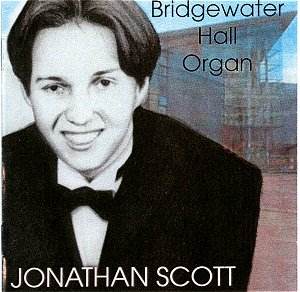This is a fascinating disc exploiting in equal measure
the tonal dimensions of the Bridgewater Hall organ and the talents of
the young Jonathan Scott. This is a programme that, in variety both
of technique and musical content, echoes a catholicity of taste that
is in some way a hallmark of Manchester music-making. There is an almost
Priestley-esque common touch in the deservedly ‘pop’ element of the
excitingly outrageous transcriptions of the "Ruslan and Ludmilla"
overture, the devastating "Danse Macabre" and the organist’s
own brilliantly-worked version of "L’Apprenti Sorcier" Nothing
in this music to be sniffed at but instead wholeheartedly enjoyed in
a welter of sound that bids fair to out-do by a mile the redoubtable
Carlo Curley!
The purist has the Bach G minor (BVW542) (with perhaps
just a hint of flagging in the peroration of the Fugue?) to be succeeded
by a modestly entitled ‘Short’ Sonata by Tom Pitfield – an unassuming
evensong Larghetto with a second movement of almost Gothic grandeur.
The Scottish Ronald Stevenson is represented by two
pieces, the second of which is a reflectively simple, yet powerful,
commentary on the psalm-tune ‘Dundee (1591). His Fugue on the Shepherd’s
Air from Wagner’s "Tristan" is the central panel of a major
work – part of a kaleidoscopic triptych whose imagery is derived from
the legend of Tristan und Isolde (in which larger complete work there
is a setting of Scots poet Tom Hubbard’s "Isolde’s Luve-Daith"
and an elaboration of the Dresden Amen). The fugal subject in this extract
is the cor anglais solo from the first scene of Act 3 of the opera,
its evocative Swiss yodel-like movement is expressive of the mountains
and swells to a truly Wagnerian climax.
A pupil of Dukas, Duruflé, like his mentor,
wrote little (tho’ half of what he did write is for organ). Perhaps
best known for his beautiful "Requiem" (opus 9) his Prelude
and Fugue on the name Alain (his friend and fellow student at the Conservatoire
killed in action aged only 29) has a kind of delicate strength. The
Prelude’s use of the motif derived from the name Alain is punctuated
by a recurring quotation from that composer’s "Litanies" culminating
in a heroic liturgical benediction. The Fugue also based on the theme
is bold, with a joyous apotheosis that shows to great effect the resources
of this magnificent instrument. Too many recordings of organ music tend
to turn the contrapuntal strands into a kind of soup. This recording,
in this hall’s acoustic is fresh and clear, with the deft fingering
of this young player articulated with admirable precision. The organ,
by Marcussen & Son of Denmark, with its four manuals and seventy-six
stops has been especially designed. It presents an imposing façade
of carefully chosen panelling and gleaming silver pipework (all 5,500+
of which are functional) and a bank of solo trumpets jutting forward
‘en chamade’. Yet the ultimate desiderata is brilliance of sound and
range of expression. This disc is a Baedecker-like guide to the impressive
range of possible sound that, in the hands of this intrepid player,
is thrilling. It is highly recommended, and not only for organ buffs.
Colin Scott-Sutherland


![]() Jonathan Scott (organ)
Jonathan Scott (organ)![]() ASC CS CD42 [59.86]
ASC CS CD42 [59.86]